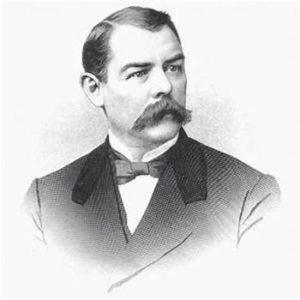
Albion Tourgee
Albion Tourgee was born on this date in 1838. He was a white-American judge and author.
Albion Winegar Tourgee, from Williamsfield, OH, was the son of Valentine Tourgee and Louisa Emma Winegar, both farmers. His mother died when he was five. He grew up in Kingsville, OH, the Western Reserve, a center of antislavery sentiment, and in Lee, MA, where he spent two years with an uncle. Tourgee attended the University of Rochester in 1859 and was active in campus Republican politics. During this time, he wrote an essay critical of the prosecutions of distributors of Hinton Helper's antislavery book ("The Impending Crisis of the South").
Tourgee was a private in the Union army and received his degree in 1862 in recognition of his military service from the University of Rochester. He fought at the Battle of Bull Run (First Manassas), where he received a severe spinal injury, which caused him temporary paralysis and a permanent back problem that plagued him for the rest of his life. In January 1863, he was captured near Murfreesboro, TN, sent to a Confederate prison, and later exchanged and returned to Ohio.
Later that year, he married Emma Doiska Kilbourne, with whom he had one child. He returned to the service and participated in major engagements at Chattanooga and Chickamauga, TN. After the war, he and his wife moved to Greensboro, N.C., partly on the advice of a doctor that he seek a warmer climate for his health.
Tourgee's commitment to racial equality, broader democracy, and protection of the economic poor, white and Black, collided with the values of most of the southern elite. From 1866 to 1867, he edited a Republican newspaper, the "Union Register," in Greensboro. Tourgee was also elected a superior court judge and served from 1868 to 1874. He roused the ire of conservative opponents of Reconstruction by insisting that Blacks be included on jury lists and that the jail be heated in winter, a concern for inmates that conservative critics believed would encourage crime.
During Tourgee's tenure as judge, the Ku Klux Klan engaged in a systematic campaign of terror and political intimidation designed to drive Blacks and their Republican allies from power. He faced threats to his safety with extraordinary courage. However, the terror had an effect, and eventually, self-styled conservatives regained control in the state. Still, an 1871 investigation by Tourgee led to the indictments of 63 members, including many from leading families, for Klan atrocities.
As Republican political power faded, so did Tourgee's hope for reelection as a judge. He did not run for reelection, and his law practice did not prosper. Tourgee wrote an autobiographical novel, "A Fool's Errand" (1879), based on his Reconstruction experiences, and he published several highly regarded legal treatises on North Carolina law. He left North Carolina in 1880, eventually moving to Chautauqua County, N.Y., in 1881.
His book was hugely successful, selling over 200,000 copies and attracting laudatory reviews. Tourgee earned substantial profits from the book and another popular Reconstruction novel, "Bricks without Straw"(1880), but he invested heavily in a failed magazine venture. Faced with large debts and struggling with physical pain and depression, he earned an increasingly precarious living by lecturing, writing less financially successful novels, and engaging in journalism, which included some mean-spirited and personal attacks on Grover Cleveland.
In 1891, Tourgee founded the National Citizens' Rights Association, an organization devoted to equality for Black citizens of America. Tourgee also served without pay as counsel in Plessy v. Ferguson (1896), an unsuccessful challenge to Louisiana's law requiring segregated railroad cars. "Justice," he wrote in his brief, "is pictured as blind, and her daughter, the Law, ought at least to be color-blind." He insisted that the requirement for "separate but equal" railroad cars established a constitutionally impermissible caste system. He inspired Justice John Marshall Harlan's dissenting dictum: "There is no caste here. Our Constitution is color blind."
In 1897, President William McKinley appointed him U.S. consul in Bordeaux, France, a post he held until his death. Albion Tourgee died on May 21, 1905.
From American National Biography,
published by Oxford University Press, Inc.,
copyright 2000
American Council of Learned Societies.